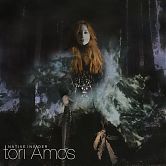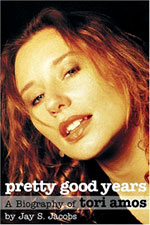- Articles
- Cherries
- Minutiae
- Q&A
- RAINN
- Releases
- Reviews
- Site News
- Them
- Toriphiles
- Touring
- TV/Radio/Web
- Video
News Archives
Keep an eye on our Twitter and Facebook pages since we often post quickie updates there when we're on-the-go.
During tours, we do our best to cover setlists in real-time on Twitter. If you want to tweet a show in, just DM or @ us on the day and tell us to watch your stream that night.
Tori is touring in 2017 to support the release of Native Invader. The European legs runs from early September through early October and the North American leg runs from late October to early December. We do not know if additional dates elsewhere will be added.

Native Invader (album, 2017)

Unrepentant Geraldines (album, 2014)

Gold Dust (album, 2012)

Night of Hunters (album, 2011)

Midwinter Graces (album, 2009)
 Abnormally Attracted To Sin (album, 2009)
Abnormally Attracted To Sin (album, 2009)
Live at Montreux 1991/1992 (DVD, 2008)

American Doll Posse (album, 2007)

A Piano (boxed set, 2006)

Pretty Good Years
(bio, 2006)

Fade To Red
(DVD, 2006)
 Comic Book Tattoo (book, 2008)
Comic Book Tattoo (book, 2008)News: Los Angeles Times Interview (December 11, 2011)
There’s a sexy element to penetrating the dead guys and making a new being together. You’re not a sonic necrophiliac but you are walking into a specific space. You have to look at the music as a sonic architect and study how it is made. Then, you must step back or you can never create because you’re in such awe of it that you feel that ‘I can’t touch this because it’s sacred.’
The Los Angeles Times is running a feature on Night of Hunters for which Marcia Adair interviewed both Tori and Deutsche Grammaphon’s Alexander Buhr. The article takes a deeper look at the genesis and evolution of the album as well as toushing on the subject of womane in the world of classical music.
A new dawn for Tori Amos with ‘Night of Hunters’
The singer-songwriter joins forces with the classical music label Deutsche Grammophon on her crossover project.
By Marcia Adair, Special to the Los Angeles Times
December 11, 2011
Reporting from London —— Creating something genuinely new in the classical crossover genre is, for many reasons, an endeavor fraught with peril. Classical fans are notoriously unkind to pop artists who want to have a go while pop fans often attack their icons for putting on airs. Those who live full time in the genre — Andrea Bocelli, Il Divo, Blake — sell millions of records by sticking to a strict formula. Songs must have big tunes and, if at all possible, be sung in Italian; the voice must be at least vaguely operatic with lots of vibrato and the singer must be handsome in a floppy-haired, Euro kind of way.
“Night of Hunters,” Tori Amos’ 12th studio album and first to be released on the classical music label Deutsche Grammophon, is everything that a crossover project has the potential to be but usually never is. She’ll play material from the album at L.A.‘s Orpheum Theater on Dec. 17 and 18.
The album began with a phone call from Deutsche Grammophon executive producer Alexander Buhr. “He said, ‘How do you feel about composing a 21st century song cycle based on classical themes?’” recalled Amos at a hotel in West London. “I said, ‘How about a drink?’”
Although not technically expelled from the preparatory division of Baltimore’s Peabody Conservatory at age 10 for her interest in pop and rock music, Amos did lose her scholarship, which in the end amounted to the same thing. She started playing professionally in gay bars, chaperoned by her Methodist minister father, at age 13. Through high school, she continued to have private piano and composition lessons. Because of her formal study, she was Deutsche Grammophon’s first choice for the project.
“Tori has the ability and creativity to pull off such a big project and was very respectful of approaching this type of music,” Buhr said.
Classical music can be vibrant and emotionally complex but is often treated — primarily by its own fans — as a museum piece or religious relic.
How did Amos feel about jumping back into that world? “There’s a sexy element to penetrating the dead guys and making a new being together,” said Amos, who lives in Cornwall, England, with her husband and daughter. “You’re not a sonic necrophiliac but you are walking into a specific space. You have to look at the music as a sonic architect and study how it is made. Then, you must step back or you can never create because you’re in such awe of it that you feel that ‘I can’t touch this because it’s sacred.’”
The first challenge was defining what exactly a 21st century song cycle was. Amos’ 2002 album “Scarlet’s Walk” was considered by many to be a song cycle, but Amos categorizes it as a pop narrative. According to Amos, a song cycle is “very clearly a story that is told through the songs themselves without dialogue necessary to follow the story. It’s not just a concept.”
The next problem to work through was language. Amos’ first instinct was to source her lyrics from 19th and 20th century poets like Goethe or Emily Dickinson, the method favored by classical composers. “I thought it was too dangerous to put my own words to classical themes that existed, but Alex argued with me and said if I used [old] poetry, then [the cycle] wasn’t active.”
The story for “Night of Hunters” is, in the tradition of great Romantic epics, a bit bonkers. In a nutshell, a woman from the New World sails to Ireland with her Old World lover. They fight, she questions herself and her relationship, and meets a wise creature, voiced by Amos’ 11-year old daughter Tash, who shape-shifts into a goose and a fox. A peyote trip and a realization that there are problems more pressing than her own quotidian drama resolve the tension.
In classical song cycles, emotions are intense but rarely alluded to directly. “When you look in pop music, and how people talk for the most part, it’s not a poetic language,” Amos said. “It was very important that there was imagery and it wasn’t just ‘And I’m so sad.’”
Musically, each of the 14 songs in the cycle is inspired by a different piece of classical music, all of which were originally without words. Adding lyrics was difficult: “I don’t believe that you can just put music to anything and it works,” Amos said. “Yes, you can put music to a phone book, but it doesn’t mean that they’re working together and making a magical expression.”
In concert, Amos performs songs from “Night of Hunters” alongside works from her catalog arranged for piano and string quartet. On the album, Amos’ longtime collaborator John Philip Shenale added flute, oboe, clarinet, bassoon and contrabassoon to the ensemble. The sound combination is pungent, pastoral and restless.
The purpose of this project was never to classicize pop songs or update standard classical rep but rather to create something new that can stand as art on its own merit. “It would be lovely if listeners who had never been into classical music went on YouTube [to listen to more classical music], but it’s not an education project,” Buhr said.
Amos’ success as a composer in the pop world has given her a platform rarely afforded her classical music counterparts. With privilege comes responsibility, something she does not wear lightly. “I want to approach it [‘Night of Hunters’] as a grafter and for all the women composers that should get commissions and were not always given them.”
It takes one hand to count the number of female classical music composers who have made a name for themselves over the last thousand years. Why, then, has she not used any of their work as source material? “The truth is,” said Amos, “variations on themes by women nobody knows is not a provocative concept. If you’re going to have trouble finding the reference, it just doesn’t mean anything.”


